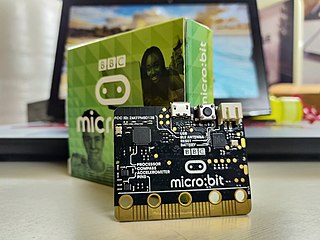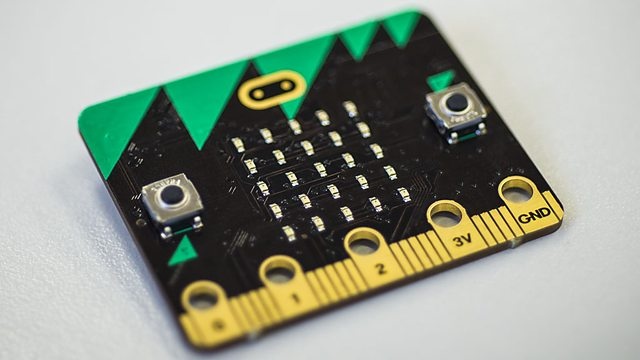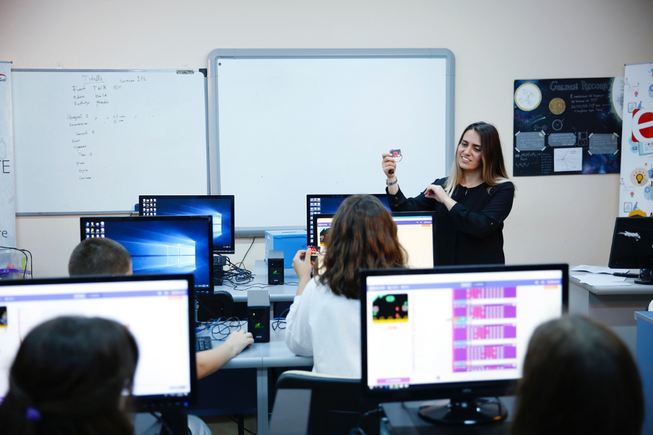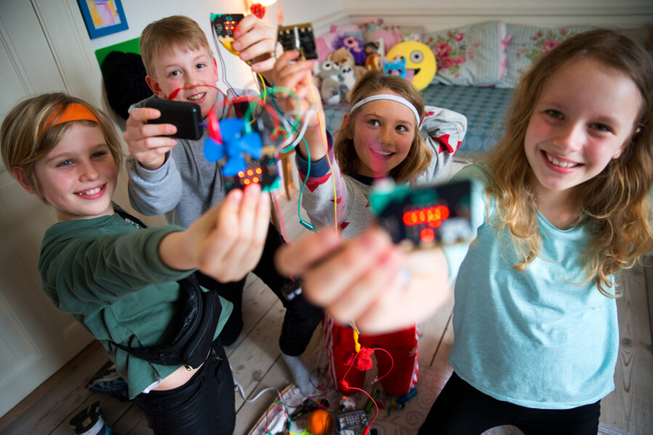Updated:
Introduction
At Makers, I am going to provide classroom sessions for kids and students, focusing on a small, cool device developed by BBC, called BBC micro:bit. This is a part of my project (the project proposal).
Wikipedia describes micro:bit as
an open source hardware ARM-based embedded system designed by the BBC for use in computer education in the UK

The hardware is designed for Science, Technology, Engineering, and Mathematics, or STEM in short. The device has interfaces for easy access, two microcomputers, a motion sensor, a magnetometer sensor, push-buttons, and an LED matrix screen.
It is a standalone device that kids, and adults alike, play, experiment, and develop products. Unlike traditional development boards, micro:bit doesn’t require additional hardware, expertise, or programming development environment on your computer. You just need a micro:bit and a computer.
BBC micro:bit in UK
Many British kids are familiar with micro:bit because the board is widely used in classrooms in UK.
BBC Micro:bit—a free single-board PC for every Year 7 kid in the UK
The BBC has unveiled the Micro:bit, the spiritual successor of the 8-bit, beige-box BBC Micro released way back in 1981. To try and propel the Micro:bit to a comparable echelon of usefulness and ubiquity—about 80 percent of British schools had at least one BBC Micro—the BBC will give a Micro:bit to every child in Year 7 (ages 11-12) across the UK, for free.
The hardware design is open-sourced, which allows any vendor to make their own micro:bit for use in education. There are dozens of vendors that manufacture their version of micro:bit in the market. They also sell adopters, peripherals, and starter kits of micro:bit.
Since then, the board has been popular in classrooms because the project “was not working with the government to incorporate the Micro:bit into the national curriculum, but instead was creating resources for teachers, parents and pupils to access from its own website”. The official project website provides not only projects for kids, but an online classroom management service, and lessons and lesson plans for teachers.
21st Century Schools
With the help of the British Council, teachers in the Western Balkans region are discovering a new way to reach disengaged students. A project aiming to equip 1 million young people with the skills they need to compete in the global labour market has shown that hard-to-reach children are often inspired by the micro:bit.
BBC micro:bit in the world
micro:bit is popular not only in UK. BBC micro:bit in school claims that there are “4.5 million micro:bit devices in 60 countries”.
DR ultra:bit
In Denmark, young people are using the micro:bit to come up with amazing tech ideas to make their parents more climate-friendly. The Crack the Climate Code competition, running throughout autumn 2019 and born out of Denmark’s ultra:bit project, is offering prizes to children aged 9-12 for the best idea and best solution.
Thanks to its open-source license, micro:bit is available from many vendors around the world, so the teachers can easily buy, experiment, and evaluate its possibilities in their classroom. MakeCode, an online development service provided by Microsoft, makes it possible to teach online even without a physical micro:bit. The service has a simulator, which runs the code in a browser, and kids can watch the behaviour of their code in the browser. You do not need any prior knowledge of micro:bit, or programming, either.
If you are a teacher have a look at Emotion badge project, one of many available projects, to see how students learn.
If you are interested, join us and support the project
As a parent, you probably need something to throw at your kids to play with. Makers will provide micro:bit, help and assistant to teachers, and a space for the classrooms. If you are interested, please support the project! The project needs:
- laptops, at least five (second-handed one in good condition costs USD 200 - 300)
- chairs and desks for kids
- a community (you)
In addition, we have a list of other things we need in the donation page.
Are you a teacher? Do you want to teach modern technologies in interesting ways? I need your help (and I can help you, too).
Please contact me at Whatsapp.
Our location
The property is located at Wat Bo 20, Siem Reap.



